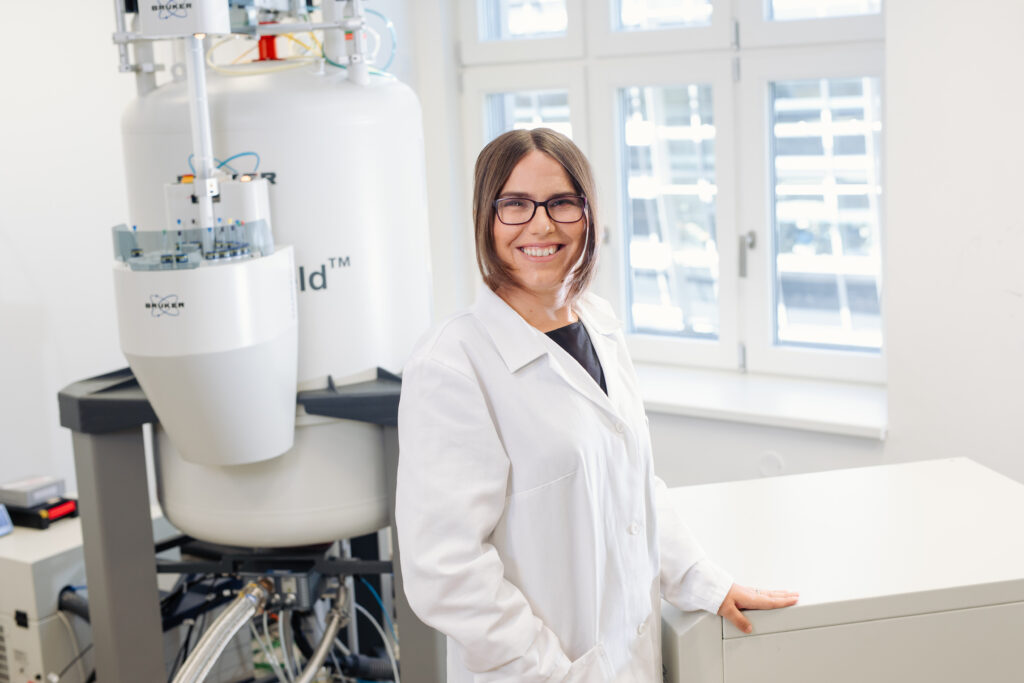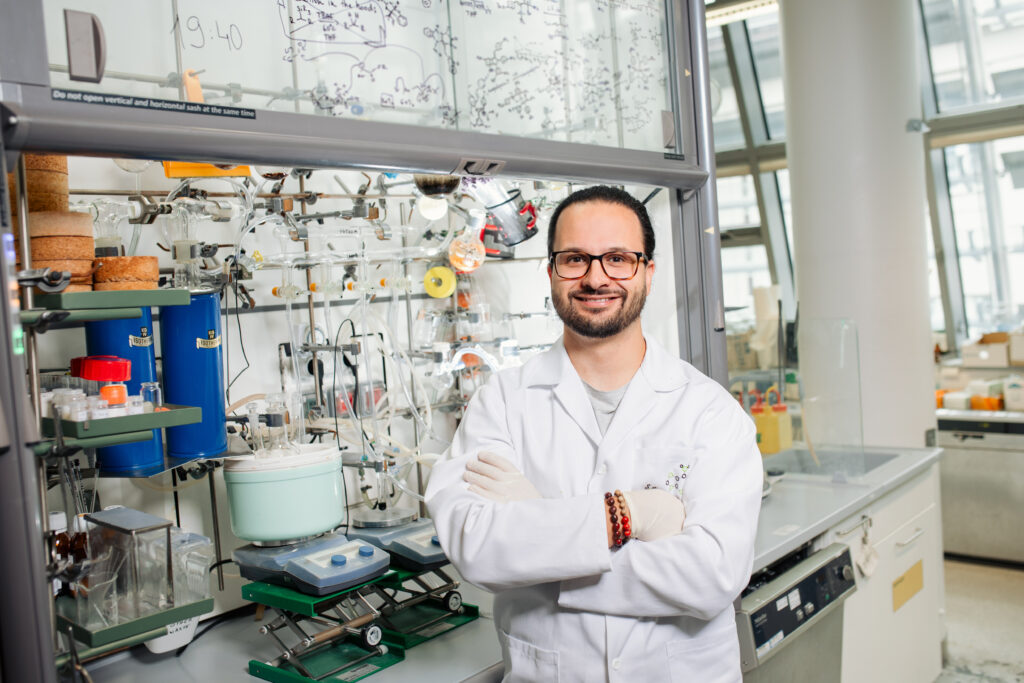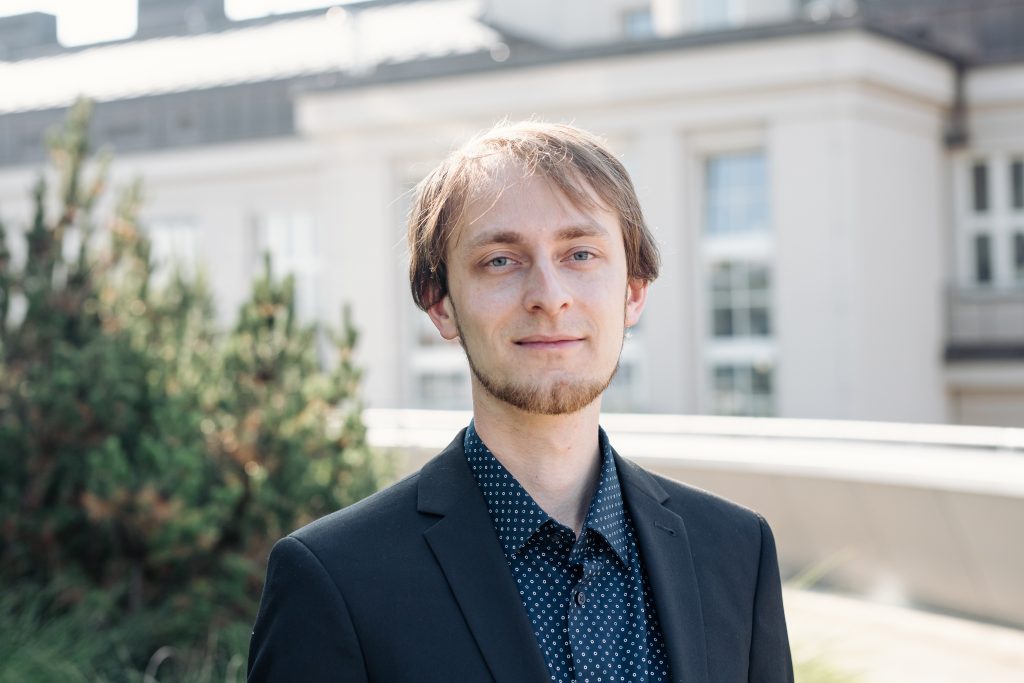Our analogs may contribute to the development of more potent antibiotics
You have devoted your research to the synthesis of recently isolated, structurally non-trivial natural products. Which products are they?
In addition to the dysiherbol synthesis (molecules 1-3 in Fig. 1), I have also worked on the synthesis of other natural products isolated from marine sponge and corals (Xeniidae and Dysidea). The said natural products are of particular interest not only due to their chemical structure but also for their biological effect. Dysiherbols display standard cytotoxic activity (the ability to induce one of the possible type of cell death) towards certain types of cancer cells, but they also display a less common type of biological activity – they inhibit NF-κB cell signalling pathway (one of the many cellular processes that is associated with the immune response in organisms). They can be therefore used for the further, more detailed study of the immune system. A unique chemical structure – an extraordinary 6-6-5-6 tetracyclic system together with four tetrasubstituted carbon stereocenters (positions 4, 5, 9, 10 in Fig. 1) encourages organic chemists in their endeavours to find an efficient synthetic approach, to discover new chemical reactions etc.

The aim of your project is to develop a unique strategy and to devise a synthetic route to prepare not only these products but also their analogs. Those are of utmost importance to you. Why is that?
Analogs of naturally occurring substances may help not only to better understand the molecular interaction mechanisms with enzymes, but they can also often display much better physicochemical properties – stability, solubility, as well as better selectivity and lower toxicity. I have spent all my life working on the preparation of substances for biological studies, and my proposal to prepare analogs has only been a logical outcome of it. Moreover, similar molecules show potent antibiotic activity even towards very resistant bacteria. Bacterial resistance to classic antibiotics will soon become a huge problem all over the world. Some of our analogs may help develop new antibiotics. And I believe that a beautiful example of how important it is to prepare analogs to naturally occurring substances are nucleoside analogs developed by Professor Antonín Holý that serve today as antiviral drugs of global importance. Were it not for these analogs, it is very likely that the Experientia Foundation would not exist either.
What can your discoveries bring to the science or the pharmaceutical industry in particular?
The results of scientific work always have several different aspects. From a chemical perspective, we can discover a brand new type of transformations that have not been described yet and that can be also later used in the synthesis of other molecules. If we succeed in preparing the target compounds in reasonable amounts, the products can undergo more detailed biological testing and it can help us better understand certain biotechnological processes in cells. Ideally, these results may lead to a design and preparation of new, highly efficient and safe drugs. Each tiny and seemingly insignificant result of scientific work may eventually serve as a very important piece of the mosaic.
How did you become interested in chemistry and why did you specialise in organic synthesis in particular?
Chemistry has been around since my childhood as both my mum and my brother are chemists. However, my passion for chemistry started at basic school. I had an amazing teacher, Ms Golasowská, and her chemistry club where we did a lot of experiments really got me interested. I also had an opportunity to participate in several Chemistry Olympiads. At first I contemplated taking up analytical chemistry but then I grew fond of organic chemistry and the relationship between the molecular structure, reactivity and properties. I came into the group of Professor Marek where I studied NMR structural analysis, isolations and subsequent modifications of natural products. Organic synthesis and medical chemistry were just a few steps away and I studied those in the group of Associated Professor Paruch while I was pursuing my PhD studies and post-doctoral research stay. For me, the combination of modern organic synthesis techniques, NMR structural analysis and follow-up biological studies are a guarantee of a comprehensive and exiting kind of research.
You have been awarded the Experientia Foundation grant and could spend one year in the research group of Professor Magauer at Leopold-Franzens-Universität in Innsbruck. Why did you find Professor Magauer’s research appealing?
During the research stay I wanted to study the synthesis of structurally non-trivial natural compounds and there are not many research groups specialising in that in Europe. I was looking for smaller groups where you can assume more intense communication among colleagues as well as with the group leader. Thomas Magauer is a very talented organic chemist, and despite his young age, he has already achieved a lot and produced very interesting publications in the field of total synthesis. Thanks to a prestigious ERC grant he has been able to move from one of the top European laboratories in Munich, where he worked closely with Professor Trauner, to Innsbruck. Personally, I welcomed this transfer since Innsbruck is a smaller town and a very friendly place for a family with small children. My colleague Dr Švenda from Masaryk University worked together with Professor Magauer at Harvard and he arranged a personal meeting with him for me and a visit at his laboratory in Innsbruck. I can only strongly advice to all future applicants for the Experientia Foundation grant to do the same, if it is at least a little possible.
What is the team of Professor Magauer working on at the moment and what part of the research are you in charge of?
The group of Professor Magauer studies the synthesis of natural products, in particular those that have never been prepared yet and show certain interesting structural specifics – a prerequisite to devise a unique synthetic route (e.g. a non-standard ring size – four- or nine-membered, a complex fusion system thereof, polyhalogenated molecules etc.). A part of the group works on the development of new reactions or conducts research of high pressure reactions which is a field of organic chemistry that has not been researched much yet. To a smaller extent there are also projects carried out in close cooperation with leading pharmaceutical companies. Each PhD student has one major project assigned and, possibly, a smaller one depending on how time consuming they are. I am a bit of an exception because I’m working on several larger projects at the same time, each being at a different phase. This may be sometimes very stressful but it is also a great challenge and a motivating factor.
What is it like to work with Professor Magauer and what crucial things have you learned from him?
Professor Magauer is a very active person and an incredibly enthusiastic scientist. He sends emails with interesting publications and literature all the time where you can find useful information relating to one of the ongoing projects. Regular reports and presentations ensure ongoing debate and project supervision. Group meetings are an invaluable source of information for me. I am still fascinated by the vast knowledge that Professor Magauer has and the same is true of students in the group. I also like that when there is a problem, Professor Magauer always quickly comes up with several solutions and possible alternative routes. Personally, I have learned to store information in a more systemic way and use critical thinking. And I would say that I look at the structure of organic molecules in a different way now.
And what are your impressions of Leopold-Franzens-Universität? How is the Austrian scientific community different from the Czech one?
The university in Innsbruck is quite small and I dare say it is a classic example of a local (Tyrol-Bavarian) university. Judging from my everyday experience at the Institute of Organic Chemistry I reckon that you can find a number of similarities with smaller scale Czech institutes – lectures are given only in German and there are only few foreign PhD students and post-doctoral fellows. It is typical here that you spend your entire science career at a single workplace. With the arrival of Professor Magauer and his group from Munich, many things changed however. For example lectures given by guests from Germany and Switzerland are only in English now and the number of foreign applicants and new students has grown as well. What, on the other hand, is very different from our university environment is the composition of research teams in general. While groups at our universities consist predominantly of younger students – bachelor’s and master’s degree students, the research projects here are carried out nearly exclusively by PhD students. They are very often motivated to write their own grant applications for funding of their studies using, for example, the Tyrol funds.
What were your goals when you went on your research stay?
I have never aspired to have the name of a top institution or a famous scientist on my CV in the first place. It does not necessarily guarantee the quality of the research stay and a well spent time. In general, I wanted to expand my knowledge and experience, work in a smaller group on interesting science projects together with enthusiastic people, and although my stay is not over yet, all my wishes have come true.
Many of your predecessors decided to extend their stay abroad. What are your plans for the future?
This is a very difficult question to answer. I will most likely not want to extend my stay abroad because of our family and my personal plans. I would like to win a start-up grant and try to implement my own scientific ideas in the Czech Republic. On the other hand, the Austrian Science Fund is offering the possibility to renew the research stay. One year is definitely a short time, especially in organic synthesis. My family and I will soon have to make the final decision.
What has the Experientia Foundation grant meant for you personally and what progress have you made in your career, and as a person, thanks to the research stay?
The entire process from meeting Professor Magauer for the first time to working in his laboratory today has been an invaluable experience. Drafting of a scientific project proposal, although it was relatively short, has been a very valuable experience, too. Being awarded a grant is a great honour of course but also a big commitment, and I will do my utmost to leave a positive impression here in Innsbruck. The research stay has also been a great experience for the whole family, especially the two older children who go to kindergarten in Innsbruck and are exposed to the foreign language in a slightly different environment on a daily basis. I firmly believe that this stay will have a long-term positive influence on both my life and career.
What message would you like to give to prospective applicants for the Experientia Foundation grant?
The Experientia Foundation presents a unique opportunity for all young scientists who want to spend time abroad on a post-doctoral research stay and work at their dream institution. Having your own funding is always attractive for prospective supervisors and unlike other funding possibilities, the administrative process of eventually getting the grant from the foundation is very easy. Do not let this amazing opportunity slip away. Experience gained abroad is always very valuable. Choose a suitable workplace and come up with a science project. Also think about what you expect from the research stay and where you want to move on in your career.
Lukáš Maier
born in Karviná in 1984. He earned his master’s degree in organic chemistry under the supervision of Professor Marek at Masaryk University in Brno. He graduated from a PhD programme and completed a post-doctoral stay there as well under the supervision of Associated Professor Paruch. Thanks to the grant in the amount of CZK 1,235,000 awarded by the Experientia Foundation he could pursue his studies abroad at Leopold-Franzens-Universität in Innsbruck, Austria, in a post-doctoral research stay in the group of Professor Magauer.
Řekli o nás
Mgr. Ondřej Kováč, Ph.D.

Mgr. Dominik Madea, Ph.D.

Ing. Karolína Vaňková, Ph.D.
Mgr. Veronika Fialová




